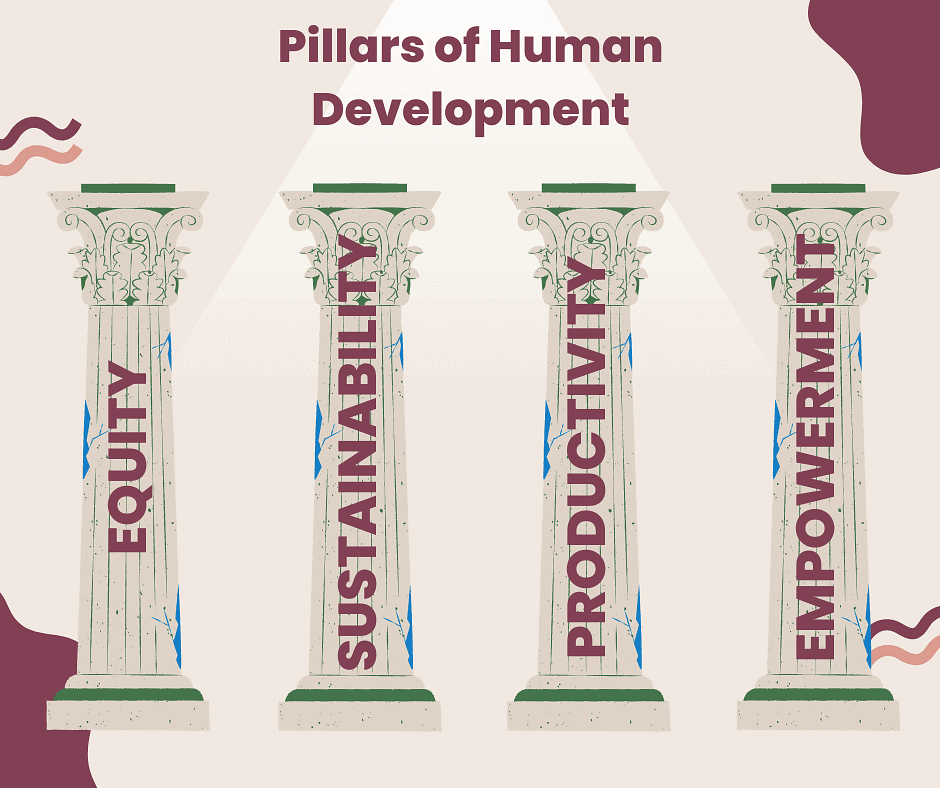Class 12 Geography Short Questions with Answers - Human Development
Q1: Why is health the key area of human development?
Ans: Health is the key area of human development and healthy people are capable of using all the resources and create wealth out of them.
Q2: Which country has proclaimed ‘Gross National Happiness’ as the measure of a country’s progress?
Ans: Bhutan is the only country in the world to officially proclaim the Gross National Happiness (GNH) as the measure of the country’s progress .
Q3: Which is the most significant aspect of human development?
Ans: Leading a long and healthy life, being able to gain knowledge and having enough means to be able to live a decent life are the most important aspects of human development.
Q4: Who introduced the concept of human development?
Ans: The concept of human development was introduced by Dr. Mahbub-ul-Haq.
 Dr. Mahbub-ul-HaqQ5: Differentiate between growth and development.
Dr. Mahbub-ul-HaqQ5: Differentiate between growth and development.
Ans: Growth is quantitative, whereas development is qualitative / Growth is value neutral, whereas development is value positive / Growth may be positive or negative, whereas development will always be positive.
Q6: Name the two South-Asian economists , who have worked together on ‘Human Development Report’.
Ans: Dr. Mahbub-ul-Haq and Amartya Sen.
Q7: What are the three basic areas of human development?
Ans: The key areas are :
(i) Access to resources
(ii) Health
(iii) Education
Q8: Define the term “Empowerment”.
Ans: Empowerment means to have the power to make choices and such power comes from increasing freedom and capability.
Q9: Why is it essential to have sustainability?
Ans: Sustainability is essential to have sustainable human development for each generation in respect of continuity and availability of opportunities.
Q10: Mention any two pillars of human development.
Ans: In total there are 4 pillars of human development: Equity, Sustainability, Productivity and Empowerment. Q11: Explain the basic needs approach and capability approach to human development.
Q11: Explain the basic needs approach and capability approach to human development.
Ans: Basic Needs Approach :
Six basic needs i.e., health, education, food, water supply, sanitation, and housing were identified. The question of human choices is ignored and the emphasis is on the provision of basic needs of defined sections.
Capability Approach :
Building human capabilities in the areas of health, education and access to resources is the key to increasing human development.
Q12: Explain three characteristics of welfare approach of human development.
Ans: (i) Welfare approach considers human beings as beneficiaries or targets of all developmental activities.
(ii) The Government must spend more money on providing education and health facilities for all. These activities are the primary responsibilities of the government.
(iii) People are not participants in development but only passive recipients.
Q13: Name the country having the lowest rank in Human Development Index in 2003.
Ans: Lowest rank in HDI in 2003 – Nigeria.
Q14: How does HDI rank the countries?
Ans: The human development index (HDI) ranks the countries based on their performance in the key areas of health, education and access to resources.
Q.15: What is the indicator of access to knowledge?
Ans: The adult literacy rate and the gross enrolment ratio represent access to knowledge. The number of adults who are able to read and write and the number of children enrolled in schools show how easy or difficult it is to access knowledge in a particular country.
Q16: How are countries with higher human development identified?
Ans: Countries with higher human development are those where a lot of investment in the social sector has taken place.
Q17: How is human poverty index related to human development?
Ans: The human poverty index is related to the human development index. This index measures the shortfall in human development.
Q18: What is the role of Human Development Index?
Ans: The human development index measures attainments in human development. It reflects what has been achieved in the key areas of human development.
Q19: Name the indexes used by the UNDP to measure human development.
Ans: The Human Development index and the Human Poverty index are two important indices to measure human development used by the UNDP.
Q20: Which country has the highest human development index?
Ans: Norway has the highest human development index.
Q21: Name four countries having high human development. Discuss three reasons for high human development index.
Ans: Four countries having high human development index are :
(i) Norway (ii) Australia (iii) Netherlands (iv) USA
 Q22: Name any four countries having low human development index. Discuss three reasons for low human development index.
Q22: Name any four countries having low human development index. Discuss three reasons for low human development index.
Ans: Four countries having low human development index are :
(i) Democratic Republic of Congo (ii) Nigeria (iii) Burundi (iv) Mozambique
Reasons for low HDI are :
(i) Political turmoil (ii) Social instability (iii) Famine (iv) High incidence of diseases
|
50 videos|273 docs|37 tests
|
FAQs on Class 12 Geography Short Questions with Answers - Human Development
| 1. What is human development in the context of humanities/arts? |  |
| 2. How does human development in humanities/arts contribute to personal growth? |  |
| 3. What are the potential career paths for individuals with a background in human development in humanities/arts? |  |
| 4. How does human development in humanities/arts contribute to society? |  |
| 5. How can individuals engage in human development in humanities/arts outside of formal educational settings? |  |

















